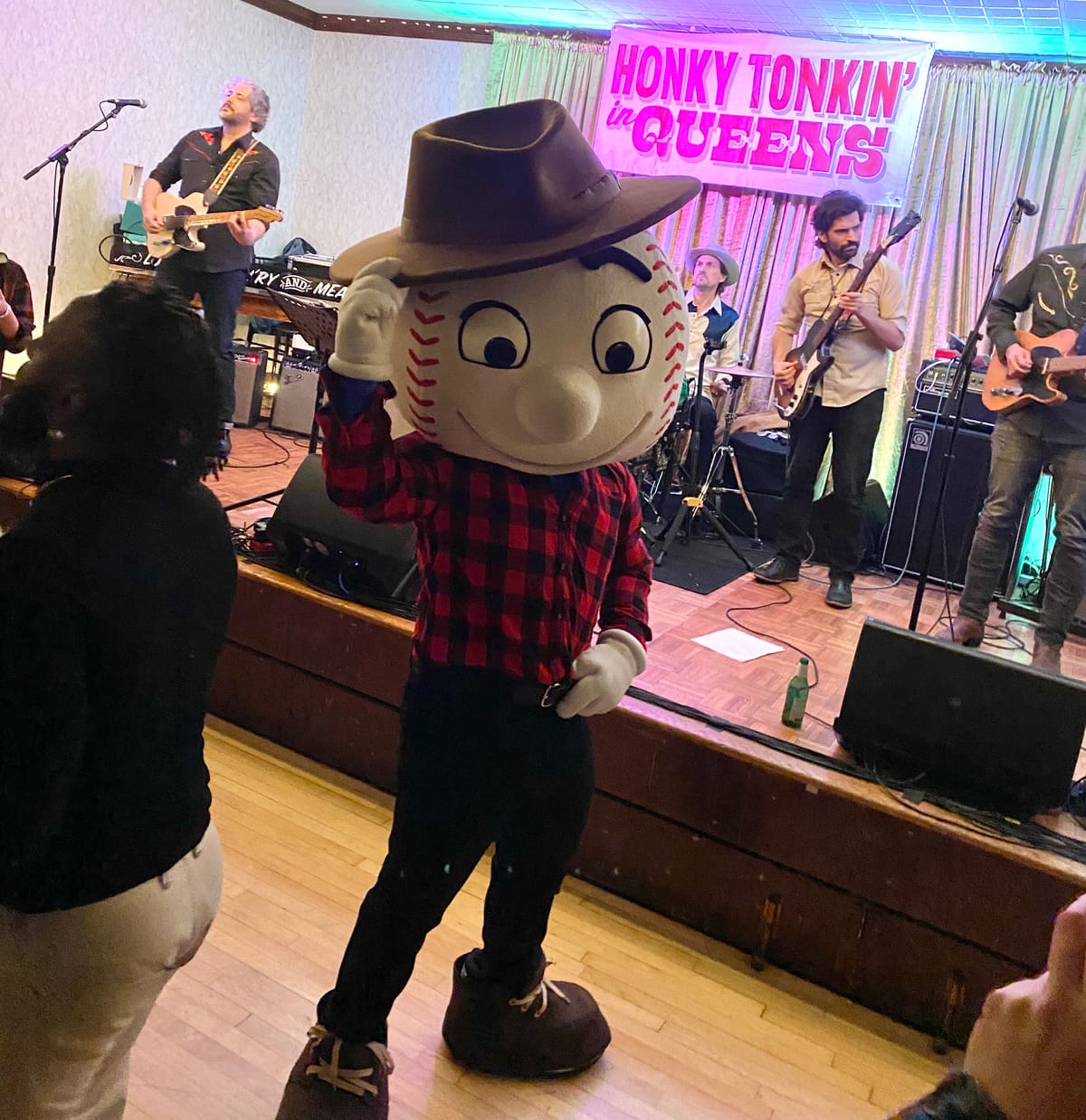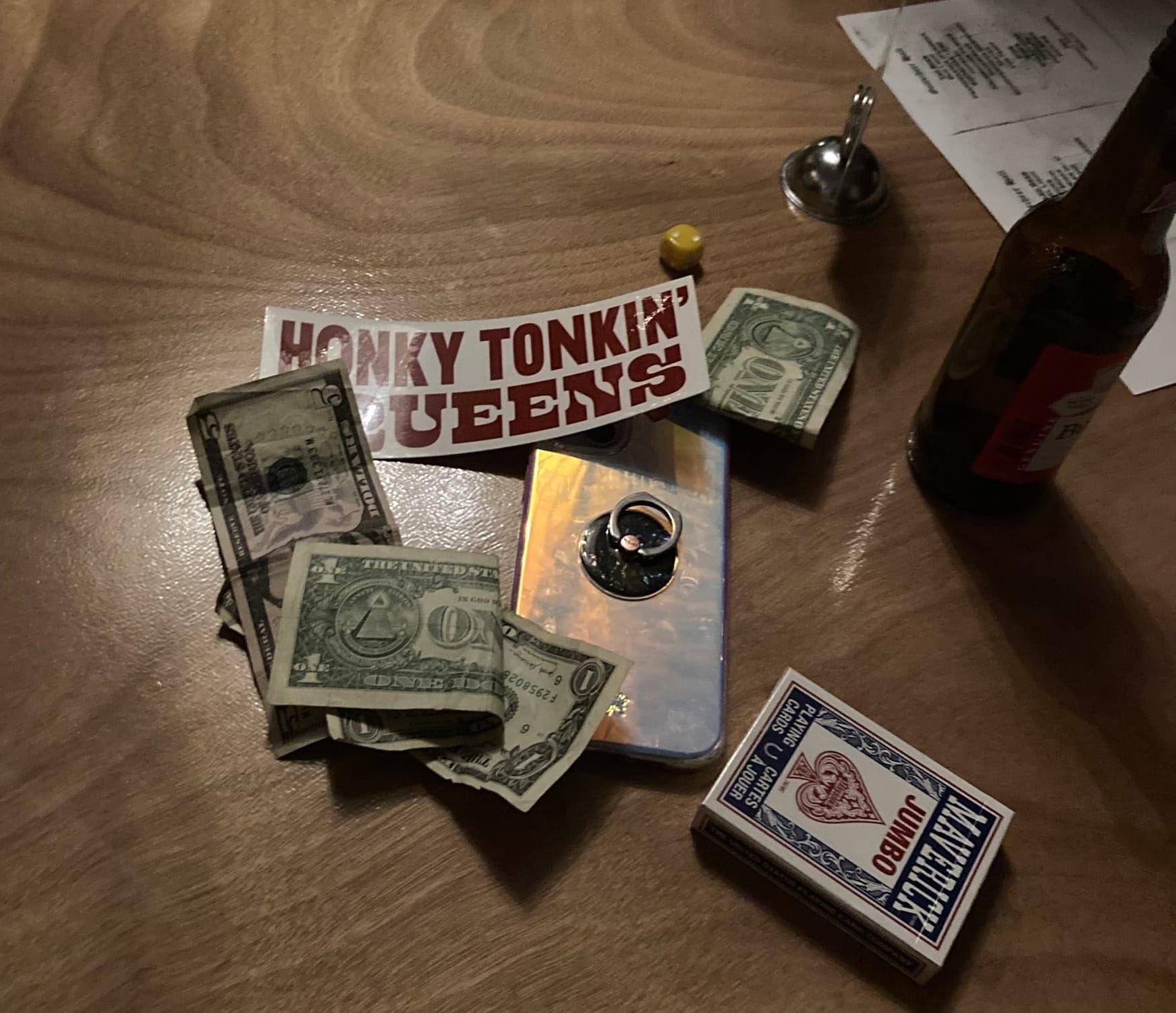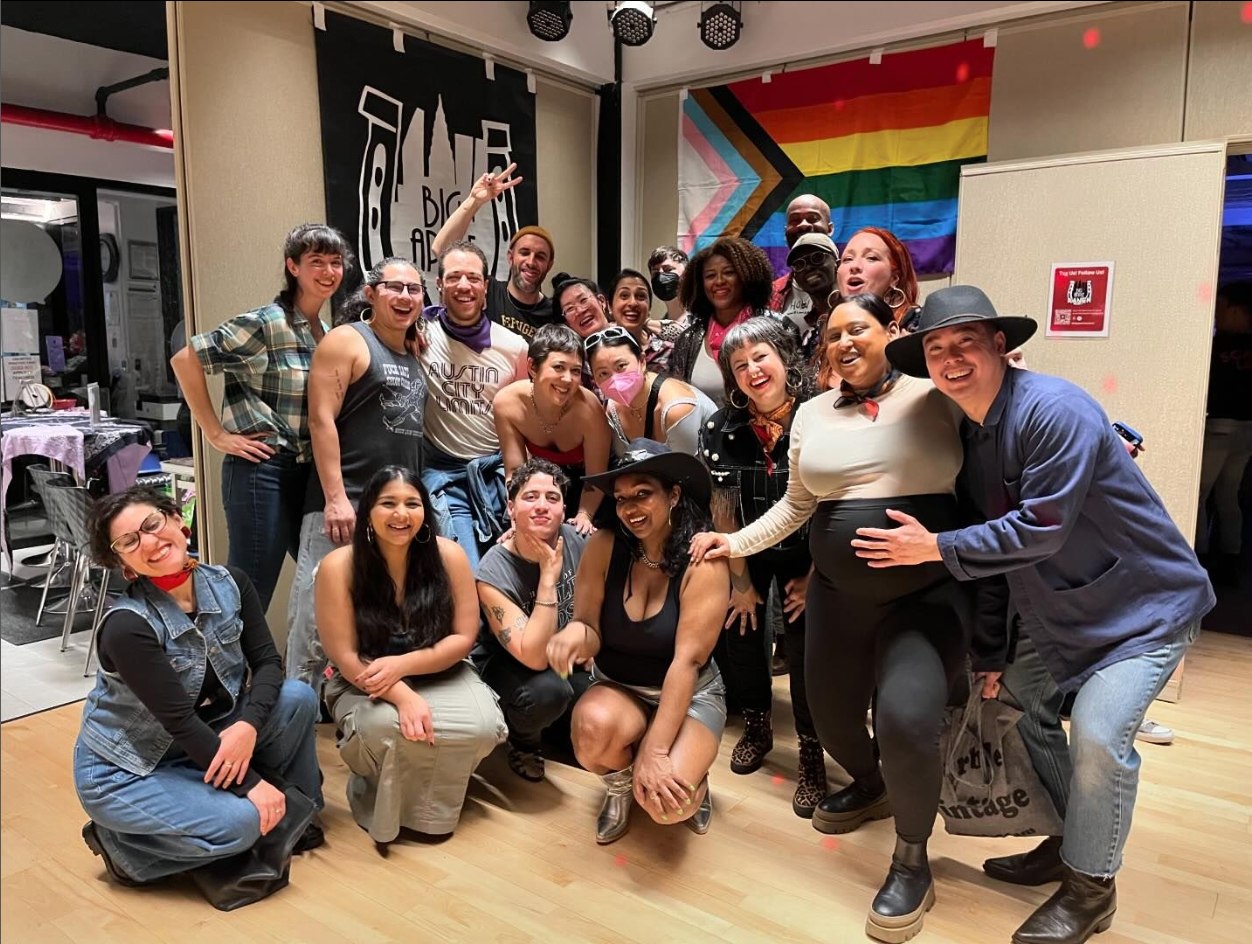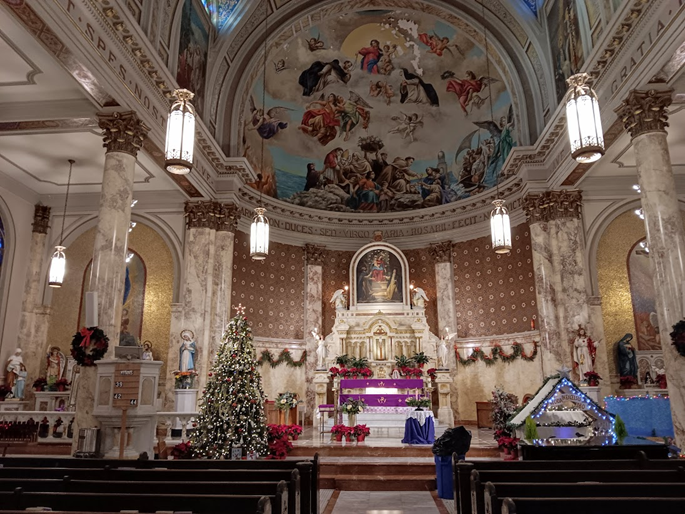Where to find a real-life boogie and a real-life hoedown in New York City
Way before Beyoncé, these NYC spots have been embracing country western music and dancing

On a Friday night in late February, I showed up to a 100-year-old German beer hall to find it packed with crowds donning their finest Western getup. The best I'd managed was a polka dot dress and a denim jacket, but this was my first rodeo, so to speak, and I was happy to take in the spectacle from the edge of the dance floor with a tallboy Hofbrau Munchen.
A band called North of Amarillo played Waylon Jennings’ “Only Daddy That’ll Walk the Line,” while dancers stomped and two-steppers twirled. Servers carrying plates of giant pretzels and bratwursts did their own equally impressive choreography to dodge them. Round tables, banquet hall style, were set up with cards and dice, like some kinda roadhouse wedding. (I lost at a game of Threes among strangers, but was thrilled at the opportunity.) Later on, Lola Kirke closed out her set with a twangy version of “Maps” by the Yeah Yeah Yeahs. My notes app from the evening includes the phrase “hot guys with mullets.” Even Mr. Met was there in his best country drip.
This ain’t Texas; it’s Ridgewood.
Indeed, the world’s ~4th coolest neighborhood~ has gotten even hotter since February 2023 when Charles Watlington, aka DJ Moonshine, and Jonny Nichols, aka DJ Prison Rodeo, transformed the back room of Gottscheer Hall into the monthly Honky Tonkin’ in Queens. The event sells out instantly now (follow Moonshine and Prison Rodeo for the next ticket drop, although April and May are already at capacity) and based on the evening I attended, I can see why. It’s rowdy, and something different, not another bar birthday.
It helps that the crowd commits to the bit — looking or at least acting the part, earnestly trying to learn the right moves. Maybe we all need to blow off steam from some lingering case of pandemic stir-crazies. Whether attendees came by their Western shirts honestly or it’s cosplay cobbled together at the thrift store, the effort counts.
“I love seeing everyone’s outfits. It’s a great place to get fashion inspiration,” said Katya Sobchenko, 33, of Bed-Stuy, who’s become a regular at Honky Tonkin’ in Queens. She’s gone on to seek out line dancing nights at venues like Alphaville, and hopes to attend more.
“I don’t know if I’m really good at [line dancing] but I have a lot of fun doing it, so that’s what matters,” she says. “I think I might be getting better.”
Collectively, we seem to be gearing up for a Big Country Spring. Beyonce’s Cowboy Carter drops March 29, with the boots-stompin’ single “Texas Hold ‘Em” already jolting the nation into (line dance) formation. Waxahatchee’s Tigers Blood came out last week with an Americana tint, while Adrianne Lenker of Big Thief sports an albino cowboy hat on the cover of her new solo album Bright Future, a record of John Prine-tinged heartbreakers. Kacey Musgraves apparently has shelved the bong and learned therapy speak for her latest album, out earlier this month; Bella Hadid has a rodeo star boyfriend for some reason, and trend pieces can tell you how to get big Texas hair like Bey and Miley.
If this mainstream twang infusion has awakened your dormant inner cowboy, or just made you more country curious, you can channel it without booking a flight to Nashville. In podunk New York town, several bars have been quietly holding it down with stellar local country acts several nights a week, for the past decade and change. Two-step and line dancing nights are selling out, from Ridgewood to the East Village. Any place, it turns out, can be a honky tonk if the music’s right and there’s a Lone Star beer in sight.
“I feel like something about the country community, it’s pretty all in favor of more people, more people dancing — it’s pretty welcoming."
As my own roots are in the Louisiana swamp, not the Texas prairie, I’ll reserve judgment on this particular strain of Southern creep. What I do have an opinion on: the proliferation of self-sustaining, micro artistic scenes, whether it’s surf-punk bands out of the Rockaways or alt-country crooners in Williamsburg, is one of the best parts of living in New York City — and the local DIY communities we have left should be supported and cherished.
“I feel like something about the country community, it’s pretty all in favor of more people, more people dancing — it’s pretty welcoming,” says John Epperly, a musician and owner of Metropolitan Sound recording studio in Williamsburg, who’s lived here 20-odd years but originally hails from Virginia. “You look around at Brooklyn, and how many people are actually from [here]? They’re from America, whatever that means.”
Epperly’s excited for the uptick, and hopes for even more interest to sustain the community, to “keep everybody working and playing gigs — more studios, more players, more songwriters — all of it,” he says.
Whether you’re fixin’ to don a bolo tie and hit the dance floor, or tap into a local music scene with a real pulse, here’s where you can get into a honky tonk state of mind just a hop, two-step and a subway stop away.

'The dive bar we always thought was nice'
Since 2013, Skinny Dennis has served up live country music nightly at the corner of Metropolitan Ave. and Berry Street, along with the dangerously delicious Willie’s Frozen Coffee, cheap beer and shot specials, and endless bar peanuts. Bonus for having one of the best vintage Miller High Life signs in town.
While some bands on the calendar hail from out of town, the majority of programming is homegrown, and free. Several local musicians make regular monthly or weekly appearances, playing three-hour sets of original songs and country standards. You really can’t go wrong any night of the week (or afternoons on weekends), but a few to shout out might include The National Reserve every Friday night, a Southern Rock/Americana outfit I first saw play New Year’s Eve, 2011 at Williamsburg’s The Drink (RIP); monthly showings from catchy, harmony-infused cosmic country five-piece Low Roller, fronted by Veronica Davila, a band that hooked me back in 2018 when I caught them on a bill at The Gutter; or newer to me, wry, sad girl country belted and crooned by Olivia Ellen Lloyd.
If you’d like to have a turn, there’s also monthly Country-oke, or if you just want to drink and vibe out, catch a vinyl set by the likes of DJ Pretty Good, DJ Jukebox Cowgirl and DJ Cat Casual. On some nights, you’re welcome to sing along, like on an early March evening, when a dozen-odd performers packed the house until the windows steamed up playing tributes for Townes Van Zandt’s birthday.
“We really take care of each other,” said Lloyd, an Appalachia native who’s lived in Brooklyn since 2015. “There’s a camaraderie around being a folk or country artist in the city, and a sense of a shared collective, in part because there’s enough [gigs] to go around. I think that makes it easy to ignore the scarcity mindset that [artists in] cities like Nashville and LA can fall into.”
Beyond Skinny Dennis, you can reliably find country music at Lucky Dog (from the same bar owners), Jones Bar in Ridgewood; The Waylon in Hell's Kitchen; and Cafe Wha in Greenwich Village; and on select evenings at venues like Main Drag in Williamsburg, and Alphaville in Bushiwck and Bar Sundown in Ridgewood. To keep up on shows, you can follow individual musicians and venues on Instagram, or check the venues’ websites for event calendar drops at the beginning of the month.
More and more bars and venues are booking country-leaning bills, or hosting nights where DJs spin country vinyl — like “Texas Tuesdays” at Bed-Stuy's Doris every third Tuesday of the month or Greenpoint bar The Drift’s weekly “Honky Tonk Sundays”.
Subway conductor called it “Houston” like the city in Texas. Twice. we used to be a real city
— Alissa Wilkinson (@alissamarie) March 27, 2024
The Northeast Country Coalition
Epperly started the Instagram account Northeast Country Coalition a year ago as a hub to post shows in the country community.
These feature flyers from fellow country musicians, along with shows like the monthly “Originals Only: A Night for the Workers in Song” at Skinny Dennis, which Epperly co-produces with Davila of Low Roller, and features three acts performing strictly original material — the idea being to encourage already-established bands to keep up their songwriting chops.
“They’ll tell me, ‘Yeah we’ve been practicing like hell, finishing songs,” said Epperly. It’s also a showcase for up-and-coming musicians, who might be making their debut at the venue. “Bands will say ‘It’s been my dream to play here’,” he says. “It’s a super rewarding thing.”
Roots in Red Hook
The southern Brooklyn answer to Skinny Dennis lies in the waterfront neighborhood of Red Hook, at Jalopy Theatre & Tavern and Sunny’s Bar.
First opening in 2006, Jalopy has fostered a community of Americana, roots music, bluegrass and traditional music, with a bit of an old-timey vibe, like you stepped inside Inside Llewyn Davis. There’s an open mic every Wednesday; a School of Music where adults (and kids, via “Jalopy Jr.”) can take classes in fiddle, harmonica, songwriting, and more; and even a Jalopy Records label. On first Wednesdays, the Roots ‘n Ruckus showcase, hosted by singer-songwriter powerhouse Feral Foster, is a great (and totally free) way to check out different musical talents in one night. Eclectic programming peppers the calendar, ranging from The Brooklyn Ukes meetup to a Lucinda Williams tribute night. There’s also live music and a full restaurant next door in the Jalopy Tavern. Look out for regular players on the roster like Wyndham Baird and The Jackson Lynch Band.
At Sunny’s — a 100-year old longshoreman bar that’s stayed open despite destruction from Hurricane Sandy, the death of its namesake and a fraught legal battle over property rights that would have sold the site to developers — owner Tone Balzano Johansen keeps the dreamy watering hole afloat with near nightly musical programming in the bar’s back room. (Check out the song “Sunny’s Bar” on Johansen’s latest album, Homecoming.) Every Saturday you can catch Tone’s bluegrass jam, a four-hour musical chairs game of performers; Western Swing on Wednesdays with Smokey’s Roundup; and more bluegrass and songwriting acts throughout the week.
Y’all means all
If you’re itchin’ to boot scoot but can’t score a ticket to Gottscheer, there are several monthly occasions where you can learn and practice either two-step or line dancing, or both.
On second Saturdays, Big Apple Ranch – a “gay-centric, straight-friendly” venue in Midtown Manhattan— hosts line dancing, two-step and swing nights, with a lesson followed by open dancing. There’s also Stud Country, a queer line dancing and two-step group based in San Francisco, Los Angeles and New York, that puts on parties with instruction and open dancing in NYC a few times a month at venues like Brooklyn Bowl and The Georgia Room.

Every Wednesday night from 8pm-midnight, and on a couple Tuesday nights a month geared towards beginners, Tenaya Kelleher teaches line dancing upstairs at The Ukrainian National Home (140 Second Ave.), which also houses the Ukrainian East Village restaurant. Kelleher posts signups for Wednesdays the day before at noon on Instagram. Word to the wise: they’ve been known to sell out pretty quickly, although Kelleher sets aside a handful of tickets for walk-ins.
Country-western quartet The Slide Stops, who play regular gigs around town, also perform as a backing band for dancers to practice their moves: Every first Sunday at Starr Bar, where Sara Lott instructs, and every third Friday, at the Burstin’ Boots Dance Party at Jalopy Theatre, where Alexander Udis, aka Sargent Seedo, leads two-step and line dancing lessons.
When I asked Udis why he thought line dancing and two-stepping is having such a moment, he wagered it might serve as some sort of post-pandemic antidote. The Kentucky native recalls hosting an outdoor line dancing night upstate, just post-lockdown in May 2021, which drew 100 people. “It was on a sloping hill, not an easy place to dance but everybody was really into it,” he said. “They kept wanting to do dances all night, in a row. We were mesmerized by it.”
Today, some of that fervor remains.
“Everybody seems to be still going out with the same passion to make up for that time,” he said. He also wondered if it might provide a release valve during societal tumult. “Maybe people need a community gathering not associated with any kind of productivity or capitalist ethic,” he says. “Dance is something that’s just pure enjoyment.”
Mr. Met honks and tonks up a storm at the last Ridgewood event. (Video by Rick Paulas)




Comments ()